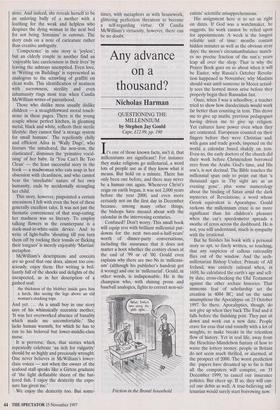Order, counter- order, disorder
Caroline Moore
WAIT TILL I TELL YOU by Candia McWilliam Bloomsbury, £14.99, pp. 244 The short stories in Wait Till I Tell You are, as the jacket flap tells us, 'bonded ... by themes that beat along their discrete but attached veins'. For this I am duly grateful. Reviewers, like GCSE students, love themes.
The stories and vignettes in the first half of the book have a Scottish setting, or characters of Scottish descent; and even those in the second half, labelled `South', still mainly circle around Scottish vices and virtues — a national psychomachie which has superbly flexible, creative potential. Tidiness, cleanliness, gentility and house- proud obsessiveness vie with drunkenness, lies and madness; efficiency with romance; neat habit with fecklessness. The sea-food stall-owner of the first tale, 'Shredding the Icebergs', sees the future of the human race as a 'contest between in the gutter singing glory and so neat you'd need to wear a headscarf to procreate'.
As this suggests, tidiness, on balance, gets distinctly the worst of it in this collec- tion. Several stories offer variations on the theme of women trapped in immaculate kitchens, for whom marriage is 'all effort and perfection and home-baking and fresh undies'. Their striving for perfection is soul-destroying: one of McWilliam's house- wives combines the two sides of the coin by being perfect and drunken, hitting the bottle after setting the house to rights. 'Perfection' is 'the problem': 'she aimed at it, achieved it, resented it and ruined it.'
In a couple of stories, the woman is manoeuvred or bullied into this self- defeating quest by a husband who is a petty control-freak. Morag in 'Seven Magpies' is married to a man who has instituted a `system' for dishcloths, and has a special pot for the unsalted butter 'that only he was permitted' to use so that it will 'avoid taking on the smells of other substances'. Morag, in the spotless kitchen where 'she never entertained', hankers after cluttered, unhygienic and generous households, and believes mess to have 'an energy if not sub- lime at any rate fully human'.
It is a nice touch, however, that there is a degree of ambiguous complicity in Morag's long-suffering subservience:
She suspected that she had invented some of his more demanding stipulations in order first to have more ways of pleasing him, and at length to have more things to blame him for.
In 'White Goods', this fine ambiguity provides the twist to the tale. The narrator seems at first to be suffering from another domestic bureaucrat: Geoffrey has 'a logical mind', checks carefully which fridge to buy, pedantically disapproves of 'the misapprehension of proper nouns', and, like Morag's husband, is depressingly sensi- tive to smells — 'at home, he can smell if the iron was on two hours ago'. But his out- burst at the end reveals that her belief that he finds her 'disappointing' is partly a pro- jection of her self-created, dirt-obsessed guilt. "Thank God," he said. "Does this mean you've let up on being the perfect bride?" ' And the couple celebrate libera- tion by eating smelly fish and chips inside the car. Chips and illicit food, indeed, arc recurrent symbols of a sort of freedom of spirit, rather a middle-class one: you have to have been brought up not to eat in the street to get such a kick from violating the taboo.
The best stories have a proper tension between the claims of order and mess; but sometimes one rebels against the authorial thumb on the scales (though perhaps it is only the housewife in me that feels there is a downside to unfresh `undies'). In 'Pass the Parcel' the narrator, a fierce old woman in a hospice, with 'hair the colour of old thin polished forks', offers the opportunity to explore some of the ambigu- ously self-regarding virtues of the devotees of elbow-grease: independence, prickly self-reliance, energy and toughness; a sort of courage, indeed. But when the narrator tells us, 'I am the tidiest person I have ever known', one guesses the condemnation in store. And indeed, she reveals herself to be an unloving bully of a mother with a loathing for the weak and helpless who despises the dying woman in the next bed for not being 'feminine' in extremis. The story ends on a note of caricature rather than creative ambiguity.
`Competence' in one story is 'joyless% but an elderly couple in another find an `enjoyable late carelessness in their lives' by leaving the ashtrays unemptied. Even love, in 'Writing on Buildings' is represented as analogous to the scrawling of graffiti on clean walls. This identification of neatness with narrowness, sterility and even inhumanity rings most true when Candia McWilliam writes of parenthood.
Those who dislike mess usually dislike children — a straightforward moral touch- stone in these pages. There is the young couple whose perfect kitchen, in gleaming metal, black and white, reflects their sterile lifestyle: they cannot find 'a storage system for small humans'. The repellently chilly and efficient Ailsa in 'Wally Dugs', who favours 'the untailored, the non-iron, the elasticated', dismisses the 'primitive vocal- ising' of her baby. In 'You Can't Be Too Clean' — the least successful story in the book — a madwoman who eats soap in her obsession with cleanliness, and who cannot bear the 'unreliable' nature of her own humanity, ends by accidentally strangling her child.
This story, however, pinpointed a certain uneasiness I felt with even the best of these generally excellent tales. It was not just the thematic convenience of that soap-eating; her madness was so literary. To employ talking flowers in the counterpane is a stark-mad-in-white-satin device, And to write of light-bulbs 'shouting till you turn them off by rocking their tonsils or flicking their tongues' is merely enjoyably 'Martian' metaphor.
McWilliam's descriptions and conceits are so good that one does, almost too con- sciously, enjoy them. Her writing is bril- liantly full of the shocks and delights of the unexpected, as in her description of a gashed seal:
the thickness of the blubber inside gave him a lurch, like seeing the legs above an old woman's stocking tops.
And yet. ... As a small boy in one story says of his whimsically eccentric mother, `It was her overworked absence of banality which made me uncomfortable.' She lacks human warmth, for which he has to run to his beloved but lower-middle-class nurse.
It is perverse, then, that stories which repeatedly celebrate 'an itch for vulgarity' should be so highly and preciously wrought. One never believes in McWilliam's lower- class voices — not when the owner of the seafood stall speaks like a Girton graduate of 'the light deflatable sheen of the bat- tered fish. I enjoy the dexterity the expo- sure has given me.'
We enjoy the dexterity too. But some- times, with metaphors as with housework, glittering perfection threatens to become a self-regarding virtue. Of Candia McWilliam's virtuosity, however, there can be no doubt.











































































 Previous page
Previous page